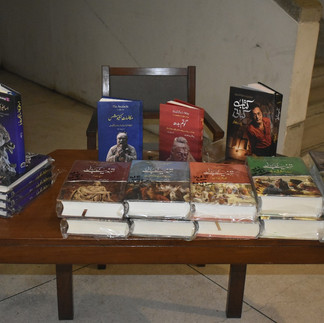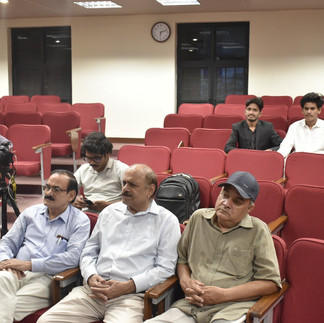An Academic Dialogue with Yasir Jawad | (Tārīkh, Tahzīb, Asāṭīr) تاریخ، تہذیب، اساطیر
- asadullah3
- Oct 12, 2025
- 2 min read
Friday, 3 October, 2025 | 6:00 - 8:00 PM | A-11 Auditorium, Academic Block, LUMS

The Gurmani Centre for Languages and Literature, LUMS, hosted a thought-provoking session featuring Yasir Javvad, writer and translator, in conversation with Taha Wasiq, a history major at LUMS. The discussion explored the politics of translation, the dialogue between civilizations, and the shifting relationship between Tehzeeb (civilization) and Saqafat (culture).
Opening the conversation, Javvad spoke about the role of translation in bringing about a “revolution of consciousness.” He described translation as a political process of negotiation that determines how two civilizations engage with each other and on what terms. The choice of which texts to translate, he argued, reflects the broader intellectual and ideological priorities of a society.
He reflected on the modern anxiety surrounding the notions of textual “authenticity” and “purity,” tracing their genealogy to religious and colonial discourses of origin and authority. Within these frameworks, the translated text is often perceived as a derivative or secondary form, lacking the sanctity of the “original.” Javvad problematized this hierarchy by suggesting that translation itself is an act of epistemic renewal, an opening through which texts live anew across linguistic and cultural boundaries. The translator’s ethical responsibility, he argued, is not merely to safeguard the author’s identity but to engage in a process of dialogical re-creation, where meaning is refracted rather than reproduced. In this sense, translation resists the linearity of transmission and reclaims interpretive agency from hegemonic languages and traditions of knowledge.
In his remarks, Yasir Javvad turned to the question of culture and civilization, drawing on his reflections from previous writings. He examined how, in contemporary discourse, the distinction between ‘civilization’ and ‘culture’ has been blurred. Culture, he argued, is often understood in terms of external practices, rituals, or fashions, while the deeper moral and intellectual dimensions of civilization are overlooked.
He invited the audience to interrogate the inherited hierarchies through which the idea of “culture” is understood and represented within our societies. Drawing attention to how colonial epistemologies classified indigenous practices as “folklore” or “tradition,” he questioned why contemporary discourse continues to associate culture primarily with the rural, the peripheral, or the pre-modern. Such an understanding, he suggested, reproduces the colonial dichotomy between the “civilized” and the “native,” where urban modernity is imagined as detached from culture and rural life is reduced to a repository of authenticity.
Yasir Javvad asked whether those living within these so-called “cultural” contexts even identify themselves through such imposed categories, or whether these labels persist as residues of colonial knowledge systems. “If Lahore and Rawalpindi today are not considered ‘cultural,’” he provocatively asked, “were they more so a hundred years ago—or is our very sense of the cultural shaped by colonial anxieties about progress and primitivism?” He further pointed out that every civilization may encompass many cultures, but a culture may not necessarily embody a single civilization. To understand this, he suggested, one must look beyond the politics of terminology and language to the ethical foundations that sustain human communities.
The conversation concluded with an engaging Q&A session, where participants reflected on the complex interconnections between translation, identity, and civilizational imagination.













